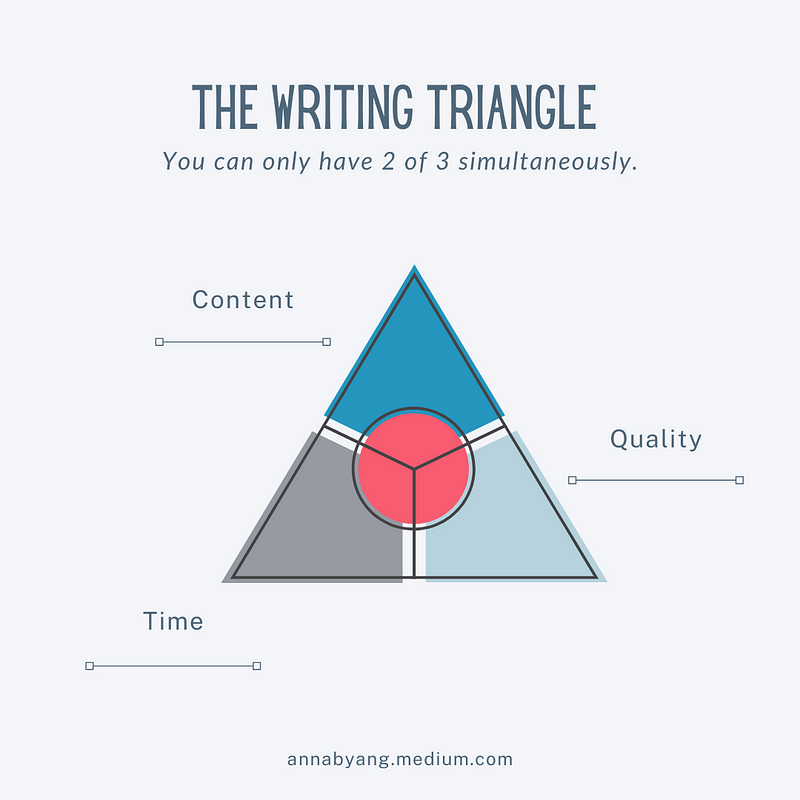The Writing Triangle: Content, Quality and Time
Hint: You can’t have all three at once

I was a product manager at a software company for many years. Coding, I learned, has a lot of similarities to writing. Software engineers have a “story to tell” (a product) and have to figure out all of the details along the way. There is often more than one way to tell a story, and it’s up to the engineer to figure out what will be the best experience.
One of the most difficult questions to answer in software development is, “How long will this take?” Engineers often have to think through the solution or plan it out before they can start coding. It’s hard to account for “thinking time.”
As a writer, I feel this deeply. I’ll sometimes noodle over the direction of a piece or work out an introduction in my head before it ever hits my keyboard. There are also times where I am stuck.
I can’t force creativity; I just need time to get unstuck.
A framework to manage expectations
Of course, as a product manager, the executive team always wanted software development to occur quickly, regardless of complexity. It also had to be free from “bugs” so that the end-users would not complain. The pressure was intense.
Then I heard about a framework that helped me push back.
Scope, quality, and time: you can only have two of the three.
I used this to ask better questions of the executive team. You can’t have a complex product, in a short timeframe, that is high quality (at least, not without adding additional resources). So what is the priority?
In early 2021, I left my job as a product manager and pursued a career in writing. The more I write, the more I realize that the same framework can be applied to writing.

The pull between content, quality, and time
Basically, the framework assumes that only two of the three can exist simultaneously between content, quality, and time.
Think of it this way:
- Content + Quality: If you are working on a lengthy piece of content and it needs to be high quality, you cannot deliver in a short timeframe.
- Time + Content: If you need to deliver something in a short timeframe that is also complex or long, quality will suffer.
- Quality + Time: If you need to deliver something that is high quality in a short timeframe, it cannot be complex.
See how that works? If you try to force all three (content, quality, and time), one will suffer. The key for writers, whether writing personally or professionally, is determining which two of the three are most important at any given time.
Work on your estimating based on 2/3
Much like software development, you’re working toward a finished product. Professional writers often face deadlines, which means that time is non-negotiable. Editors or clients expect the work to be delivered on a specific date.
Which means that you’re working with either quality or content. If a certain length is required, determine the level of quality that you can provide. I am not advocating for bad writing (there is plenty of garbage on the internet), but choosing an easier topic might be necessary.
If the piece requires a lot of high-quality research or in-depth interviews, then the end result should be shorter to meet the deadline, due to the prep time that will be required.
Or, if the piece doesn’t need research, but the audience is more sophisticated (higher quality), then it should also be shorter. The prep work, length, and your effort in crafting the piece are your content and quality variables.
The number of “hours” may be hard to quantify, especially if it’s a topic you don’t have a lot of experience with. Start to plot the amount of time it takes on other writing projects, whether you write blog articles, are a journalist, or have personal projects. Over time, you’ll have a better idea of the effort needed to complete a piece.
Push back when necessary (and give yourself a buffer)
If there are demands on both content and quality, the deadline should reflect the amount of time needed. Here is where you can rely on your experiences from past projects.
In software development, every project was essentially “new” but it would usually have similarities to past work. As a product manager, I could draw on these efforts to determine realistic deadlines. If it wasn’t, then I asked questions of the management team: Do you want to pull back on the scope (do less)? Or do you want us to cut corners, like reduce the amount of time spent testing the product before it is released? Or do you want to give the team more time?
The same questions can be applied to writing when all three things are needed (content, quality, and time). Which one is going to give? You need to get comfortable in saying, “I cannot do all three. So which two take priority?”
Remember to give yourself a buffer. Build in some thinking time or planning time — time that you’re not actively doing research or writing, but the time you need to think through your execution.
If you’re working on personal projects or making money writing online with your own content, be realistic about what you want to achieve. Novels, poetry, memoirs, blogs… they all have the same demands of content, quality, and time.
So…. what happens when all three are needed?
If the demands are complex content, high quality, and short timeframe, then what? How can all three be accomplished?
There is a fourth variable that can enter the equation: resources. In software development, this meant more developers working on the project or offering bonuses/overtime to developers to put in more effort. Resources could be more money or more people but always comes at a cost.
If you work with clients, charge more. You’re going to put in more time — longer days, sacrificing other clients or personal time — to deliver. The cost should reflect this.
If you are a staff writer, ask for help with research or collaborate with another writer. If additional compensation is possible, ask for it.
What you can’t control
Personal projects are likely the hardest to control. You probably have an emotional attachment to your work. You may be willing to sacrifice sleep or time with family to work on your writing. The resource that you’re sacrificing, in this case, is your attention on things other than writing.
For anything you write, keep content, quality, and time at the forefront. You can plan better and be a better writer when you learn how to balance the three and prioritize which two of the three are most needed for your work.
Check out my free eBook — a guide for creators looking to better manage their time and content across multiple platforms.





